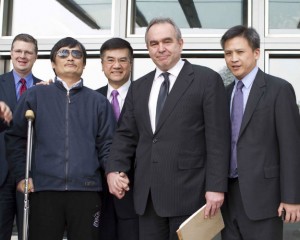The State Department has bungled and mismanaged the situation of Chinese activist Chen Guangcheng seeking asylum in the U.S., now having apparently abandoned him for a worse fate than if they never got involved.
After escaping from captivity of Chinese authorities who have abused and repressed him for his reformist activism, Mr. Chen was inside the U.S. Embassy in China for six days asking to be flown to the U.S. “on Hillary Clinton’s plane.” If he left the protection of the U.S. Embassy, he said, him and his family would be targeted.
The State Department then fumbled in confusion deciding what to do. They reportedly, and according to Chen, relayed to the frightened activist threats that the Chinese authorities would harm his wife and family unless he was released from American protection. American officials subsequently had to deny these reports, which would have exposed their acquiescence to China’s terrible human rights policies if true. Chen’s friend corroborated his story about U.S. officials relaying threats to the family.
Finally, the State Department made a deal with Chinese authorities to let Chen go to the hospital to receive medical treatment and then be released to start a new life in the Chinese city of Tianjin, a liberal city near the capital far away from his remote home in Shandong Province. U.S. officials said they got assurances from Chinese officials that they would not harm Chen.
But now Chen claims he has been abandoned at the hospital, having expected continued help from the Americans and frightened of severe retribution from the Chinese government.
Beijing then issued a scathing statement to domestic news media saying the role the United States had played in the matter “is totally unacceptable to China.” It said “China is very unhappy over this. The U.S. action is an interference in China’s internal affairs and China cannot accept it.” The statement also demanded an apology from Washington and that the officials involved in the affair be punished.
Chen is still contacting U.S. officials and asking to come to the United States. Objecting to the Obama administration’s handling of the affair, Sen. Lindsey Graham said, “The Chinese government should be put on notice this case will have an impact on future relations between our two nations. We have leverage to use, but we need the will to do so.” Apparently ignorant of the potential fallout of magnifying the situation, Graham added, “The case of Mr. Chen is fast becoming a defining moment in U.S.-China relations.”
Washington has a contradictory approach to China. On the one hand, it ignores the systemic human rights abuses in the country while relying on them to buy up mountains of American debt. On the other, it is boisterous and aggressive on the international stage as the Obama administration surges its military and naval presence in Asia-Pacific in an explicit effort for contain China’s rising influence.
If nothing else, the mishandled affair of Chen Guangcheng is an example of why the U.S. should not be entangling itself in the internal affairs of other nations, especially when it could make the situation much worse for those civilians involved.



